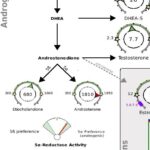Acne is a condition whereby the pores of the hair follicles are blocked and fill up with sebaceous fluids. These may then become infected with bacteria and form pustules, spots and cysts. If these are left to grow they may leave scarring and damage to the skin. In addition to this, acne can cause sufferers to experience poor body image and low self esteem.
Hormones
Acne will often first appear during puberty, when the production of male hormones (called androgens) increases. It can also occur (or clear up) during times of hormonal change such as pregnancy and the menopause. If acne starts in adult women, it can be a sign of a hormonal imbalance, especially if it’s accompanied by other symptoms such as excessive body hair (hirsutism) or irregular or light periods. The most common cause of hormonal imbalances in women is polycystic ovary syndrome (PCOS). Elevated testosterone can feature in PCOS, but not always. However, acne may also result from the activity of an enzyme which converts testosterone to a more active form called dihydrotestosterone (DHT).
 So, as outlined in the oestrogen metabolism blog post, the pathways these hormones are going down is just as important as the actual levels of the hormones. In this image testosterone levels are normal but there is a preference for the 5-alpha reductase pathway.
So, as outlined in the oestrogen metabolism blog post, the pathways these hormones are going down is just as important as the actual levels of the hormones. In this image testosterone levels are normal but there is a preference for the 5-alpha reductase pathway.
5a-Reductase is the enzyme that catalyses the conversion of (among others) testosterone to DHT. This is about three times as potent as testosterone. Certain plant compounds and herbs (like EGCG from green tea or saw palmetto) may help to block 5a-Reductase. However, testing should always be carried out to make sure this is in fact what is happening.
Digestion as as a driver
Digestive issues can be another common driver of acne. There is a well- known link between an overgrowth of bacteria in the small intestine and acne rosacea for example. Other imbalances or dysbiosis in the gut can manifest as a mini infection or inflammatory skin condition such as acne. Bacteria can also produce toxins called lipopolysaccharides or LPS which can do a number on your skin and slow down the rate of acne scars healing. It can be helpful to understand your bacterial balance and see if some of these LPS producers are taking up more real estate than they should.
If you would like more information about the services we offer, including testing, please get in touch.


